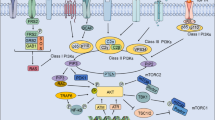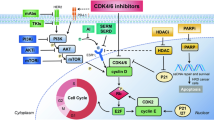Abstract
Triple-negative breast cancer (TNBC) represents the most aggressive subtype of breast cancer that is highly resistant to current therapeutic options. According to the public databases Oncomine and KM plotter, the CLK4 expression is correlated with poor patient survival in TNBC, especially in mesenchymal-like TNBC (MES-TNBC) that has strong metastatic potential. Therefore, we investigated the potential involvement of CLK4 in the metastasis and progression of MES-TNBC. In the MES-TNBC cell lines, the CLK4 expression was elevated. Notably, the RNAi-mediated silencing of CLK4 reduced the expression of multiple epithelial-mesenchymal transition (EMT) genes that mediate metastasis. Furthermore, CLK4 silencing reduced both the invasive behaviors of the cultured cells and tumor metastasis in the mouse xenograft model. It is also noteworthy that CLK4 silencing repressed the invasive and cancer stem cell (CSC) properties that are induced by the TGF-β signaling. Importantly, the pharmacological inhibition of CLK4 potently repressed the invasion and proliferation of MES-TNBC cell lines and patient-derived cells, which demonstrates its clinical applicability. Collectively, our results suggest that CLK4 plays a crucial role in invasion and proliferation of MES-TNBC, especially in the processes that are induced by TGF-β. Also, this study characterizes CLK4 as a novel therapeutic target in breast cancer.
This is a preview of subscription content, access via your institution
Access options
Subscribe to this journal
Receive 12 print issues and online access
$259.00 per year
only $21.58 per issue
Buy this article
- Purchase on Springer Link
- Instant access to full article PDF
Prices may be subject to local taxes which are calculated during checkout







Similar content being viewed by others
Change history
20 July 2022
A Correction to this paper has been published: https://doi.org/10.1038/s41417-022-00509-7
References
Bray F, Ferlay J, Soerjomataram I, Siegel RL, Torre LA, Jemal A. Global cancer statistics 2018: GLOBOCAN estimates of incidence and mortality worldwide for 36 cancers in 185 countries. CA Cancer J Clin. 2018;68:394–424.
Ahmad A. Breast cancer statistics: recent trends. Adv Exp Med Biol. 2019;1152:1–7.
Siegel RL, Miller KD, Jemal A. Cancer statistics, 2020. CA Cancer J Clin. 2020;70:7–30.
Riggio AI, Varley KE, Welm AL. The lingering mysteries of metastatic recurrence in breast cancer. Br J Cancer. 2021;124:13–26.
Harbeck N, Penault-Llorca F, Cortes J, Gnant M, Houssami N, Poortmans P, et al. Breast cancer. Nat Rev Dis Prim. 2019;5:66.
Fares J, Fares MY, Khachfe HH, Salhab HA, Fares Y. Molecular principles of metastasis: a hallmark of cancer revisited. Signal Transduct Target Ther. 2020;5:28.
Al-Mahmood S, Sapiezynski J, Garbuzenko OB, Minko T. Metastatic and triple-negative breast cancer: challenges and treatment options. Drug Deliv Transl Res. 2018;8:1483–507.
Karaayvaz M, Cristea S, Gillespie SM, Patel AP, Mylvaganam R, Luo CC, et al. Unravelling subclonal heterogeneity and aggressive disease states in TNBC through single-cell RNA-seq. Nat Commun. 2018;9:3588.
Jiang Y-Z, Ma D, Suo C, Shi J, Xue M, Hu X, et al. Genomic and transcriptomic landscape of triple-negative breast cancers: Subtypes and treatment strategies. Cancer Cell. 2019;35:428–440.e5.
O’Conor CJ, Chen T, González I, Cao D, Peng Y. Cancer stem cells in triple-negative breast cancer: a potential target and prognostic marker. Biomark Med. 2018;12:813–20.
Hill BS, Sarnella A, Capasso D, Comegna D, Del Gatto A, Gramanzini M, et al. Therapeutic potential of a novel αvβ3 antagonist to hamper the aggressiveness of mesenchymal triple negative breast cancer sub-type. Cancers (Basel) 2019;11:139.
Yang L, Shi P, Zhao G, Xu J, Peng W, Zhang J, et al. Targeting cancer stem cell pathways for cancer therapy. Signal Transduct Target Ther. 2020;5:8.
Ye X, Brabletz T, Kang Y, Longmore GD, Nieto MA, Stanger BZ, et al. Upholding a role for EMT in breast cancer metastasis. Nature 2017;547:E1–3.
Yeung KT, Yang J. Epithelial-mesenchymal transition in tumor metastasis. Mol Oncol. 2017;11:28–39.
Hao Y, Baker D, Ten Dijke P. TGF-β-mediated epithelial-mesenchymal transition and cancer metastasis. Int J Mol Sci. 2019;20:2767.
Dongre A, Weinberg RA. New insights into the mechanisms of epithelial-mesenchymal transition and implications for cancer. Nat Rev Mol Cell Biol. 2019;20:69–84.
Gooding AJ, Schiemann WP. Epithelial-mesenchymal transition programs and cancer stem cell phenotypes: Mediators of breast cancer therapy resistance. Mol Cancer Res. 2020;18:1257–70.
Liu S, Chen S, Zeng J. TGF β signaling: a complex role in tumorigenesis (Review). Mol Med Rep. 2018;17:699–704.
Ding M-J, Su KE, Cui G-Z, Yang W-H, Chen L, Yang M, et al. Association between transforming growth factor-β1 expression and the clinical features of triple negative breast cancer. Oncol Lett. 2016;11:4040–4.
Martín Moyano P, Němec V, Paruch K. Cdc-like kinases (CLKs): biology, chemical probes, and therapeutic potential. Int J Mol Sci. 2020;21:7549.
Iwai K, Yaguchi M, Nishimura K, Yamamoto Y, Tamura T, Nakata D, et al. Anti-tumor efficacy of a novel CLK inhibitor via targeting RNA splicing and MYC-dependent vulnerability. EMBO Mol Med [Internet]. 2018;10. Available from: https://doi.org/10.15252/emmm.201708289
Lee H-B, Han W, Ko S, Kim M-S, Lim S, Lee K-M, et al. Abstract P6-04-02: Identification of ESR1 splice variants associated with prognosis in estrogen receptor positive breast cancer. Cancer Res. 2016;76(4 Supplement):P6-04-02-P6-04–02.
Győrffy B. Survival analysis across the entire transcriptome identifies biomarkers with the highest prognostic power in breast cancer. Computational Struct Biotechnol J. 2021;19:4101–9. https://doi.org/10.1016/j.csbj.2021.07.014
da Silva MR, Moreira GA, Gonçalves da Silva RA, de Almeida Alves Barbosa É, Pais Siqueira R, Teixera RR, et al. Splicing regulators and their roles in cancer biology and therapy. Biomed Res Int. 2015;2015:150514.
Huang HH, Ferguson ID, Thornton AM, Bastola P, Lam C, Lin Y-HT, et al. Proteasome inhibitor-induced modulation reveals the spliceosome as a specific therapeutic vulnerability in multiple myeloma. Nat Commun. 2020;11:1931.
Aiello NM, Maddipati R, Norgard RJ, Balli D, Li J, Yuan S, et al. EMT subtype influences epithelial plasticity and mode of cell migration. Dev Cell. 2018;45:681–695.e4.
Pal M, Chen H, Lee BH, Lee JYH, Yip YS, Tan NS, et al. Epithelial-mesenchymal transition of cancer cells using bioengineered hybrid scaffold composed of hydrogel/3D-fibrous framework. Sci Rep. 2019;9:8997.
Bellomo C, Caja L, Moustakas A. Transforming growth factor β as regulator of cancer stemness and metastasis. Br J Cancer. 2016;115:761–9.
Rosenthal AS, Tanega C, Shen M, Mott BT, Bougie JM, Nguyen D-T, et al. An inhibitor of the Cdc2-like kinase 4 (Clk4). In: Probe Reports from the NIH Molecular Libraries Program. Bethesda (MD): National Center for Biotechnology Information; 2010.
Wang Y, Bao Y, Zhang S, Wang Z. Splicing dysregulation in cancer: from mechanistic understanding to a new class of therapeutic targets. Sci China Life Sci. 2020;63:469–84.
Xu X, Zhang L, He X, Zhang P, Sun C, Xu X, et al. TGF-β plays a vital role in triple-negative breast cancer (TNBC) drug-resistance through regulating stemness, EMT and apoptosis. Biochem Biophys Res Commun. 2018;502:160–5.
Janik K, Popeda M, Peciak J, Rosiak K, Smolarz M, Treda C, et al. Efficient and simple approach to in vitro culture of primary epithelial cancer cells. Biosci Rep [Internet]. 2016;36. Available from: https://doi.org/10.1042/BSR20160208
Campaner E, Zannini A, Santorsola M, Bonazza D, Bottin C, Cancila V, et al. Breast cancer organoids model patient-specific response to drug treatment. Cancers (Basel). 2020;12:3869.
Faridi N, Bathaie SZ, Abroun S, Farzaneh P, Karbasian H, Tamanoi F, et al. Isolation and characterization of the primary epithelial breast cancer cells and the adjacent normal epithelial cells from Iranian women’s breast cancer tumors. Cytotechnology 2018;70:625–39.
Gagliano T, Shah K, Gargani S, Lao L, Alsaleem M, Chen J, et al. PIK3Cδ expression by fibroblasts promotes triple-negative breast cancer progression. J Clin Invest. 2020;130:3188–204.
Zhang Y, Qian J, Gu C, Yang Y. Alternative splicing and cancer: a systematic review. Signal Transduct Target Ther. 2021;6:78.
Yang Q, Zhao J, Zhang W, Chen D, Wang Y. Aberrant alternative splicing in breast cancer. J Mol Cell Biol. 2019;11:920–9.
El Marabti E, Younis I. The cancer spliceome: Reprograming of alternative splicing in cancer. Front Mol Biosci. 2018;5:80.
Yoshida T, Kim JH, Carver K, Su Y, Weremowicz S, Mulvey L, et al. CLK2 is an oncogenic kinase and splicing regulator in breast cancer. Cancer Res. 2015;75:1516–26.
Naro C, Bielli P, Sette C Oncogenic dysregulation of pre-mRNA processing by protein kinases: challenges and therapeutic opportunities. FEBS J [Internet]. 2021;(febs.16057). Available from: https://doi.org/10.1111/febs.16057
Hu Y, Zhu Q-N, Deng J-L, Li Z-X, Wang G, Zhu Y-S. Emerging role of long non-coding RNAs in cisplatin resistance. Onco Targets Ther. 2018;11:3185–94.
Hatzidaki E, Daikopoulou V, Apostolou P, Ntanovasilis DA, Papasotiriou I. Increased breast cancer cell sensitivity to cisplatin using a novel small molecule inhibitor. J Cancer Res Ther. 2020;16:1393–401.
Hill DP, Harper A, Malcolm J, McAndrews MS, Mockus SM, Patterson SE, et al. Cisplatin-resistant triple-negative breast cancer subtypes: multiple mechanisms of resistance. BMC Cancer. 2019;19:1039.
Shibue T, Weinberg RA. EMT, CSCs, and drug resistance: the mechanistic link and clinical implications. Nat Rev Clin Oncol. 2017;14:611–29.
Ashrafizadeh M, Zarrabi A, Hushmandi K, Kalantari M, Mohammadinejad R, Javaheri T, et al. Association of the epithelial-mesenchymal transition (EMT) with cisplatin resistance. Int J Mol Sci. 2020;21:4002.
Colak S, Ten Dijke P. Targeting TGF-β signaling in cancer. Trends Cancer 2017;3:56–71.
Xie F, Ling L, van Dam H, Zhou F, Zhang L. TGF-β signaling in cancer metastasis. Acta Biochim Biophys Sin (Shanghai). 2018;50:121–32.
Cantelli G, Crosas-Molist E, Georgouli M, Sanz-Moreno V. TGFΒ-induced transcription in cancer. Semin Cancer Biol. 2017;42:60–9.
Zhang M, Wu J, Mao K, Deng H, Yang Y, Zhou E, et al. Role of transforming growth factor-β1 in triple negative breast cancer patients. Int J Surg. 2017;45:72–6.
Acknowledgements
This study was supported by the National Research Foundation of Korea (NRF) grant funded by the Korea government (MSIT) (No. 2018R1A2A2A05022732) and Samsung Research Funding Center of Samsung Electronics (No. SRFC-MA1501-51).
Author information
Authors and Affiliations
Contributions
EK and WH conceived the ideas. EK designed the studies, performed the experiments, and interpreted the data. EK and KG wrote and polished the manuscript. KG conducted literature search for setting up the experiments involving inhibitors. SYJ, JGJ, HKK, HBL and WH prepared the clinical samples and contributed to data analysis. All authors have read and approved the final manuscript.
Corresponding author
Ethics declarations
Competing interests
The authors declare no competing interests.
Additional information
Publisher’s note Springer Nature remains neutral with regard to jurisdictional claims in published maps and institutional affiliations.
Rights and permissions
About this article
Cite this article
Kang, E., Kim, K., Jeon, S.Y. et al. Targeting CLK4 inhibits the metastasis and progression of breast cancer by inactivating TGF-β pathway. Cancer Gene Ther 29, 1168–1180 (2022). https://doi.org/10.1038/s41417-021-00419-0
Received:
Revised:
Accepted:
Published:
Issue Date:
DOI: https://doi.org/10.1038/s41417-021-00419-0
This article is cited by
-
Cdc2-like kinases: structure, biological function, and therapeutic targets for diseases
Signal Transduction and Targeted Therapy (2023)
-
SLC12A8 mediates TKI resistance in EGFR-mutant lung cancer via PDK1/AKT axis
Journal of Cancer Research and Clinical Oncology (2023)



